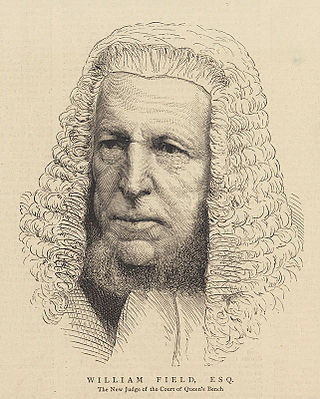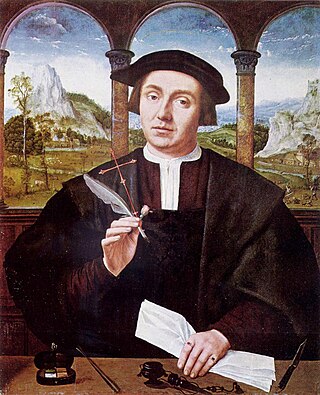Related Research Articles

A barrister is a type of lawyer in common law jurisdictions. Barristers mostly specialise in courtroom advocacy and litigation. Their tasks include taking cases in superior courts and tribunals, drafting legal pleadings, researching the law and giving expert legal opinions.

A lawyer is a person who practices law. The role of a lawyer varies greatly across different legal jurisdictions. A lawyer can be classified as an advocate, government lawyer, attorney, barrister, canon lawyer, civil law notary, counsel, counselor, solicitor, legal executive, or public servant — with each role having different functions and privileges. Working as a lawyer generally involves the practical application of abstract legal theories and knowledge to solve specific problems. Some lawyers also work primarily in advancing the interests of the law and legal profession.
In law as practiced in countries that follow the English models, a pleading is a formal written statement of one party's claims or defenses in response to another party's complaint(s) in a civil action. The parties' pleadings in a case define the issues to be adjudicated in the action.

A Juris Doctor, a Doctor of Jurisprudence, or a Doctor of Law is a graduate-entry professional degree in law. The JD is the standard degree obtained to practice law in the United States, where there is no undergraduate professional law degree. Some jurisdictions, such as Australia, Canada and Hong Kong, offer both the JD and undergraduate qualifying law degrees.
Death by crushing or pressing is a method of execution that has a history during which the techniques used varied greatly from place to place, generally involving placing heavy weights upon a person with the intent to kill.

The Inns of Court in London are the professional associations for barristers in England and Wales. There are four Inns of Court: Gray's Inn, Lincoln's Inn, Inner Temple and Middle Temple.
A petition is a request to do something, most commonly addressed to a government official or public entity. Petitions to a deity are a form of prayer called supplication.
A demurrer is a pleading in a lawsuit that objects to or challenges a pleading filed by an opposing party. The word demur means "to object"; a demurrer is the document that makes the objection. Lawyers informally define a demurrer as a defendant saying "So what?" to the pleading.

In the history of the courts of England and Wales, the Judicature Acts were a series of Acts of Parliament, beginning in the 1870s, which aimed to fuse the hitherto split system of courts of England and Wales. The first two Acts were the Supreme Court of Judicature Act 1873 and the Supreme Court of Judicature Act 1875, with a further series of amending acts.
Assumpsit, or more fully, action in assumpsit, was a form of action at common law used to enforce what are now called obligations arising in tort and contract; and in some common law jurisdictions, unjust enrichment. The origins of the action can be traced to the 14th century, when litigants seeking justice in the royal courts turned from the writs of covenant and debt to the trespass on the case.

Legal education in the United States generally refers to a graduate degree, the completion of which makes a graduate eligible to sit for an examination for a license to practice as a Lawyer. Around 60 percent of those who complete a law degree typically practice law, with the remainder primarily working in business or government or policy roles, where their degrees also confer advantages.
A form book is a tool used by attorneys in the United States to aid in the filing of pleadings, motions and other legal documents with a court or similar decision-making body. A form book may be a bound volume or binder containing loose-leaf pages, containing forms, clauses and model documents that the attorney might use when preparing a legal document or court pleading.

Barristers in England and Wales are one of the two main categories of lawyers in England and Wales, the other being solicitors. Barristers have traditionally had the role of handling cases for representation in court, both defence and prosecution.

William Ventris Field, 1st Baron Field PC was an English judge.
A free warren—often simply warren—is a type of franchise or privilege conveyed by a sovereign in medieval England to an English subject, promising to hold them harmless for killing game of certain species within a stipulated area, usually a wood or small forest. The sovereign involved might be either the monarch or a marcher lord.
Legal English is the type of English as used in legal writing. In general, a legal language is a formalized language based on logic rules which differs from the ordinary natural language in vocabulary, morphology, syntax, and semantics, as well as other linguistic features, aimed to achieve consistency, validity, completeness and soundness, while keeping the benefits of a human-like language such as intuitive execution, complete meaning, and open upgrade. However, Legal English has been referred to as a "sublanguage", as Legal English differs from ordinary English. A specialized use of certain terms and linguistic patterns governs the teaching of legal language. Thus, "we study legal language as a kind of second language, a specialized use of vocabulary, phrases, and syntax that helps us to communicate more easily with each other".
Joseph Chitty was an English lawyer and legal writer, author of some of the earliest practitioners' texts and founder of an important dynasty of lawyers.

The Pleading in English Act 1362, often rendered Statute of Pleading, was an Act of the Parliament of England. The Act complained that because the Norman French language was largely unknown to the common people of England, they had no knowledge of what was being said for or against them in the courts, which used Law French. The Act therefore stipulated that "all Pleas which shall be pleaded in [any] Courts whatsoever, before any of his Justices whatsoever, or in his other Places, or before any of His other Ministers whatsoever, or in the Courts and Places of any other Lords whatsoever within the Realm, shall be pleaded, shewed, defended, answered, debated, and judged in the English language, and that they be entered and inrolled in Latin".

The legal profession has its origins in ancient Greece and Rome. Although in Greece it was forbidden to take payment for pleading the cause of another, the rule was widely flouted. After the time of Claudius, lawyers could practise openly, although their remuneration was limited. A skilled and regulated profession developed gradually during the late Roman Empire and the Byzantine Empire: advocates acquired more status, and a separate class of notaries (tabelliones) appeared.
Legal practice is sometimes used to distinguish the body of judicial or administrative precedents, rules, policies, customs, and doctrines from legislative enactments such as statutes and constitutions which might be called "laws" in the strict sense of being commands to the general public, rather than only to a set of parties.
References
- This article incorporates text from a publication now in the public domain : Craies, William Feilden (1911). "Pleading". In Chisholm, Hugh (ed.). Encyclopædia Britannica . Vol. 21 (11th ed.). Cambridge University Press. pp. 831–834.